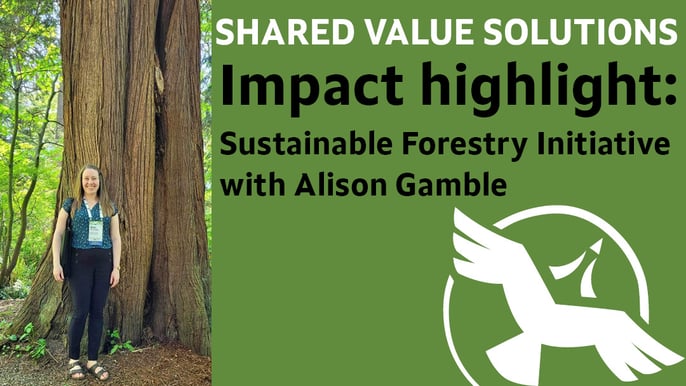
In today's Impact Highlight, we hear from Alison Gamble, Senior Environmental Chemist and Science Team Lead with SVS. Alison sits on the External Review Panel for the Sustainable Forestry Initiative of North America. Read today's post to learn about her experience.
"I saw involvement with the panel as one small way that I can help advance reconciliation and the recognition and respect of Indigenous Rights within the forestry sector." Alison Gamble
This past year I continued to serve my first three-year term as a member of the External Review Panel for the Sustainable Forestry Initiative of North America. I agreed to volunteer on the Panel because I have had many clients express their frustrations to me about how Canada’s forestry sector currently engages with Indigenous Nations, and I saw involvement with the panel as one small way that I can help advance reconciliation and the recognition and respect of Indigenous Rights within the forestry sector.
The Panel’s mission is to provide an ongoing and independent review of the SFI program’s sustainability standards, and to advise their Board of Directors on appropriate changes that they can make to the program to make it more successful in achieving its sustainability goals. The panel also seeks to ensure that public comments received on their Standards and Annual Report are fairly and objectively incorporated into future revisions. The Panel aims to have representation from a variety of external perspectives, including conservation scientists, foresters, Indigenous groups, academic researchers, federal bodies, and the private industry.
In 2022 SFI launched their updated forest sustainability standards, and part of the updates included changes to their objective to “Recognize and Respect Indigenous Rights” in the forestry sector. The commitment to reconciliation and Indigenous inclusion was evident throughout the annual conference, with Indigenous representation on every panel and in every session throughout the conference, and a specific session on respecting UNDRIP in the forestry industry. The opening remarks from SFI’s President and CEO, Kathy Abusow, highlighted the importance of the forestry industry moving forward and doing their part towards reconciliation, and she invited all of the participants to reflect on what they could do to advance the needle on reconciliation in their own work and interactions.
Over the past year, I have participated in a variety of Panel activities, including Zoom meetings, review reports and data, and two in-person meetings. In May 2023 the Panel met in Vancouver, BC in advance of attending the annual SFI Conference. This was my first time meeting the rest of the panel off-screen, and it was a great opportunity to collaborate and discuss our role as an external panel.
In October 2023, I joined the panel in our second in-person meeting of the year in Washington, DC where we reviewed SFI’s workplan for 2024 and provided input on the annual report.
I am proud of our panel's contributions to SFI's sustainability standards and look forward to contributing again in 2024!
This post is part of our 2023 Impact Highlight blog series!
SVS has a long track record of volunteering for initiatives both close to home and in the communities we work with, and a yearly company-wide target of 400 hours of volunteer time. The policy exists to enable and encourage SVS employees to contribute and support initiatives that have direct social and environmental impacts in both our local and client communities.
We hope you will find inspiration in these stories!
Today's story was contributed by Alison Gamble.

|
Alison is a senior environmental chemist and project director at SVS, as well as the Environmental Science Team Lead. She is a registered Chartered Chemist in Ontario and is a member of the Society of Environmental Toxicology and Chemistry, where she sits on an international steering committee for the integration of Indigenous Knowledge and Values with western science.
Alison has experience in designing, leading, and reporting on environmental monitoring, both from a Western science and two-eyed seeing approach. She has a strong background in planning and facilitating community meetings, engagement sessions, and workshops. Alison is experienced in conducting third party reviews of technical reports, that are grounded by community values, concerns, and impacts to Rights and Interests. She has developed and delivered curriculum for professional development and adult learning courses, including Environmental Monitoring and Indigenous Guardians Programs. Alison holds a master’s degree in environmental sciences and a bachelor’s degree in chemistry, both from the University of Guelph. She is a proud Métis woman, and has been fishing ever since she could hold a rod and reel and foraging wild edibles since she started walking. Combined with a deep scientific curiosity, this has led Alison to become passionate about using both Indigenous science and western science together to protect traditional ways of life and promote healthy Lands and Waters. |
